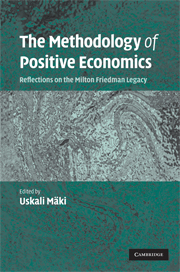Book contents
- Frontmatter
- Contents
- List of figures
- List of tables
- Contributors
- Preface
- Part 1 The classical essay in twentieth-century economic methodology
- Part 2 Reading and writing a classic
- 1 Reading the methodological essay in twentieth-century economics: map of multiple perspectives
- 2 Early drafts of Friedman's methodology essay
- 3 Unrealistic assumptions and unnecessary confusions: rereading and rewriting F53 as a realist statement
- Part 3 Models, assumptions, predictions, evidence
- Part 4 Theoretical context: firm, money, expected utility, Walras and Marshall
- Part 5 Concluding perspectives
- Index
3 - Unrealistic assumptions and unnecessary confusions: rereading and rewriting F53 as a realist statement
Published online by Cambridge University Press: 02 December 2009
- Frontmatter
- Contents
- List of figures
- List of tables
- Contributors
- Preface
- Part 1 The classical essay in twentieth-century economic methodology
- Part 2 Reading and writing a classic
- 1 Reading the methodological essay in twentieth-century economics: map of multiple perspectives
- 2 Early drafts of Friedman's methodology essay
- 3 Unrealistic assumptions and unnecessary confusions: rereading and rewriting F53 as a realist statement
- Part 3 Models, assumptions, predictions, evidence
- Part 4 Theoretical context: firm, money, expected utility, Walras and Marshall
- Part 5 Concluding perspectives
- Index
Summary
Introduction
Depending on the reader's intellectual preferences and capacities, the experience of reading Milton Friedman's 1953 essay on economic methodology (F53 for short) tends to be either one of relief and conviction or one of irritation and provocation – or perhaps some mixture of these feelings. Many practicing economists have found the message of the essay appealing and liberating, and its arguments convincing. Most specialists in economic methodology, and some practicing economists, have found F53 entirely defective, presenting a dangerously misguided doctrine of scientific theory and method. Both of these responses may be based on an incomplete understanding of the essay, or so I want to argue.
I will argue for two sets of general claims. First, there is no unambiguous doctrine or argument presented in F53. The essay presents no unproblematically identifiable single methodology of economic theorizing. The message of F53 cannot be captured by popular phrases like “Friedman's instrumentalism” or “Friedman's as-if methodology” or “Friedman's argument in support of unrealistic assumptions” or the “F-twist”. This is because F53 also contains strong anti-instrumentalist elements; because “as if ” is itself highly flexible and compatible with a variety of philosophical outlooks; and because F53 argues for unrealistic (and sometimes for realistic) assumptions from sets of mutually incompatible premises. What the reader is served is an F-mix, a mixture of ingredients many of which are ambiguous and some of which are hard to reconcile with one another. In consequence, a variety of readers with different intellectual tastes will be able to find in F53 their own selection of ideas that they will endorse or oppose.
- Type
- Chapter
- Information
- The Methodology of Positive EconomicsReflections on the Milton Friedman Legacy, pp. 90 - 116Publisher: Cambridge University PressPrint publication year: 2009
- 16
- Cited by



